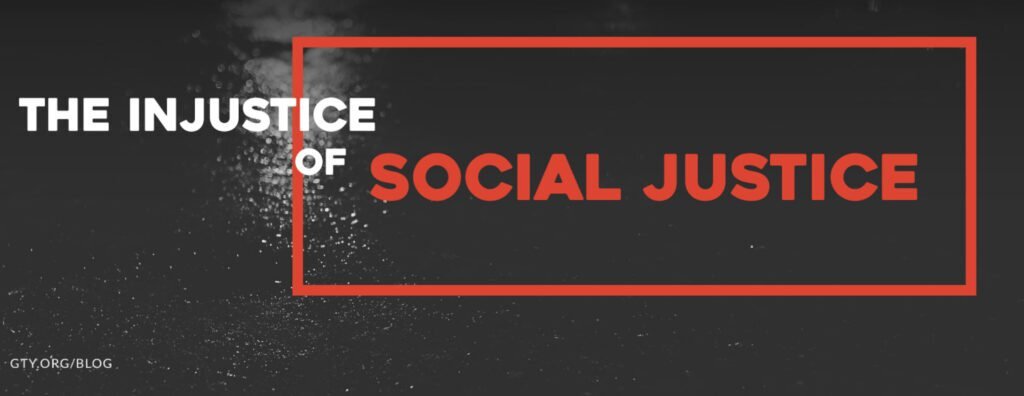The following is John MacArthur’s third installment on the social justice movement in evangelicalism titled The Injustice of Social Justice.

The besetting sin of pragmatic, style-conscious evangelicals has always been that they shamelessly borrow fads and talking points from the unbelieving world. Today’s evangelicals evidently don’t believe the wisdom of this world is foolishness before God (1 Corinthians 3:19). Virtually any theory, ideology, or amusement that captures the fancy of secular pop culture will be adopted, slightly adapted, perhaps cloaked in spiritual-sounding language, propped up with specious proof texts, and peddled as an issue that is vital for evangelicals to embrace if we don’t want to become totally irrelevant.
That’s precisely how evangelicals in the mid-twentieth century became obsessed for several decades with positive thinking, self-esteem, and “Christian psychology.” After that, it was marketing savvy and promotional strategies. By the beginning of the twenty-first century, it was postmodernism, repackaged and aggressively promoting itself as the Emerging Church movement.
Today, critical race theory, feminism, intersectional theory, LGBT advocacy, progressive immigration policies, animal rights, and other left-wing political causes are all actively vying for evangelical acceptance under the rubric of “social justice.”
Not every evangelical leader currently talking about social justice supports the full spectrum of radical causes, of course. Most (for the moment, at least) do not. But they are using the same rhetoric and rationale of victimhood and oppression that is relentlessly employed by secularists who are aggressively advocating for all kinds of deviant lifestyles and ideologies. Anyone who claims victim status can easily and effectually harness the emotional appeal of a plea for “social justice” both to gain support and to silence opposition.
Indeed, as social justice rhetoric has gained currency among evangelicals, just about every cause that is deemed politically correct in the secular world is steadily gaining momentum among evangelicals. It would be folly to pretend the social justice movement poses no threat whatsoever to evangelical conviction.
Evangelicals seldom explicitly define what they mean by “social justice”—possibly because if they gave an accurate definition of where that term came from and what it means in the secular academy, they might lose a lot of evangelical support. Countless critics have pointed out that the rhetoric of “social justice” is deeply rooted in Gramscian Marxism. For many decades, “social justice” has been employed as political shorthand by radical leftists as a way of calling for equal distribution of wealth, advantages, privileges, and benefits—up to and including pure Marxist socialism.
The rhetoric has been effective, and nowadays the typical social justice warrior is convinced that equal opportunity and equal treatment under the law are not sufficiently just; we haven’t achieved true social justice until we have equality of outcome, status, and wealth. That’s why we hear so much about income comparisons, racial quotas, and other statistics suggesting, for example, that systemic oppression by a male oligarchy is conclusively proved by the dearth of women who pursue careers in STEM fields (science, technology, engineering, and math).
Marxists, socialists, anarchists, and other radicals purposely use such arguments to foment resentment, class warfare, ethnic strife, tension between the genders, and other conflicts between various people groups, because in order to restructure society to fit their ideologies, they must first break down existing societal norms.
All of that is true, and the connection between Marxism and postmodern social justice rhetoric is surely a valid and important point. But it is even more vital that we as Christians employ the light of Scripture to scrutinize and evaluate the ideas currently being promoted in the name of social justice.
No Justice but God’s Justice
The Bible has much to say about justice. In the English Standard Version of the Bible, the word is used more than 130 times. It is never preceded by an adjective, except in Ezekiel 18:8, which speaks of “true justice.” It is occasionally paired with possessive pronouns. God Himself speaks of “my justice” twice in Scripture. Twice in prayers addressed to God, we read the expression “your justice.”
The point? There are not different flavors of justice. There is only true justice, defined by God Himself and always in accord with His character.
It is a fact that the Bible puts enormous stress on the charitable aspects of justice—goodwill toward all; compassion for the underprivileged; assistance for the fatherless and the widow; love for foreigners; and care for the poor, especially providing needy people with the necessities of life (Deuteronomy 10:18; Psalm 140:12; Ezekiel 22:29).
But biblical justice is not a one-sided affair, showing partiality to the poor or disenfranchised in an effort to even the scales of privilege. In fact, Scripture expressly condemns that mentality as unjust (Exodus 23:3; Leviticus 19:15).











